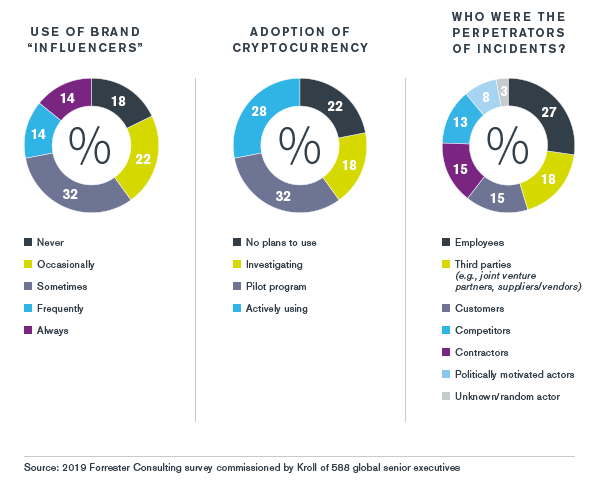Many countries with a wealth of natural resources are still developing anti-fraud regulatory and enforcement capabilities and building cultures of transparency. It is therefore not surprising that the extractives industry (including oil, gas, and mining) experiences a comparatively high rate of fraud by internal parties (36 percent vs. 27 percent for all industries) and money laundering (22 percent vs. 16 percent for all industries). In line with these findings, across all types of incidents, the extractives sector has a larger-than-average share of perpetrators who are “politically motivated actors” (8 percent vs. 6 percent for all industries)—a category that includes government officials. In addition, along with manufacturing, extractives suffers from among the greatest incidence of leaks of internal information (46 percent vs. 39 percent for all industries) and reputational damage due to third-party relationships (34 percent vs. 29 percent for all industries). This last finding may be the result of consumers’ increased attention to the environmental impact of corporate practices.

The extractives industry has aligned its risk priorities with the threats that it currently faces. Indeed, its respondents were more likely than those of any other industry to prioritize fighting leaks of internal information (82 percent vs. 73 percent for all industries) and fraud by internal parties (78 percent vs. 66 percent overall). And while the degree of reported disruption due to sanctions, tariffs and trade agreements in the extractives industry is only slightly higher than average (30 percent vs. 27 percent for all industries), this sector’s respondents are most likely to make mitigating that risk a priority (70 percent vs. 62 percent for all industries).
The extractives industry is notable for how often incidents are detected by internal audit. Respondents in this industry say that the internal audit function identified 36 percent of incidents, a larger share than in any other (vs. 28 percent for all industries). In line with this, the extractives industry is second only to technology in agreeing that serious breaches of risk management processes are met with thorough internal investigations (80 percent vs. 75 percent for all industries). At the same time, there is room for improvement in the industry’s culture with respect to transparency and accountability: Just 66 percent of extractives respondents assert that their companies respond to risk management incidents in consistent ways (vs. 75 percent for all industries). Only the manufacturing industry reports a lower rate overall.
Looking ahead, three potential risks cause significantly above-average concern among extractives respondents, and all three are tied to economic stability: the possibility of a significant financial crisis (76 percent vs. 69 percent for all industries), destabilization of fiat currency due to cryptocurrency (60 percent vs. 53 percent overall) and disruptions due to artificial intelligence, which could have implications for commodities trading (66 percent vs. 56 percent overall).
